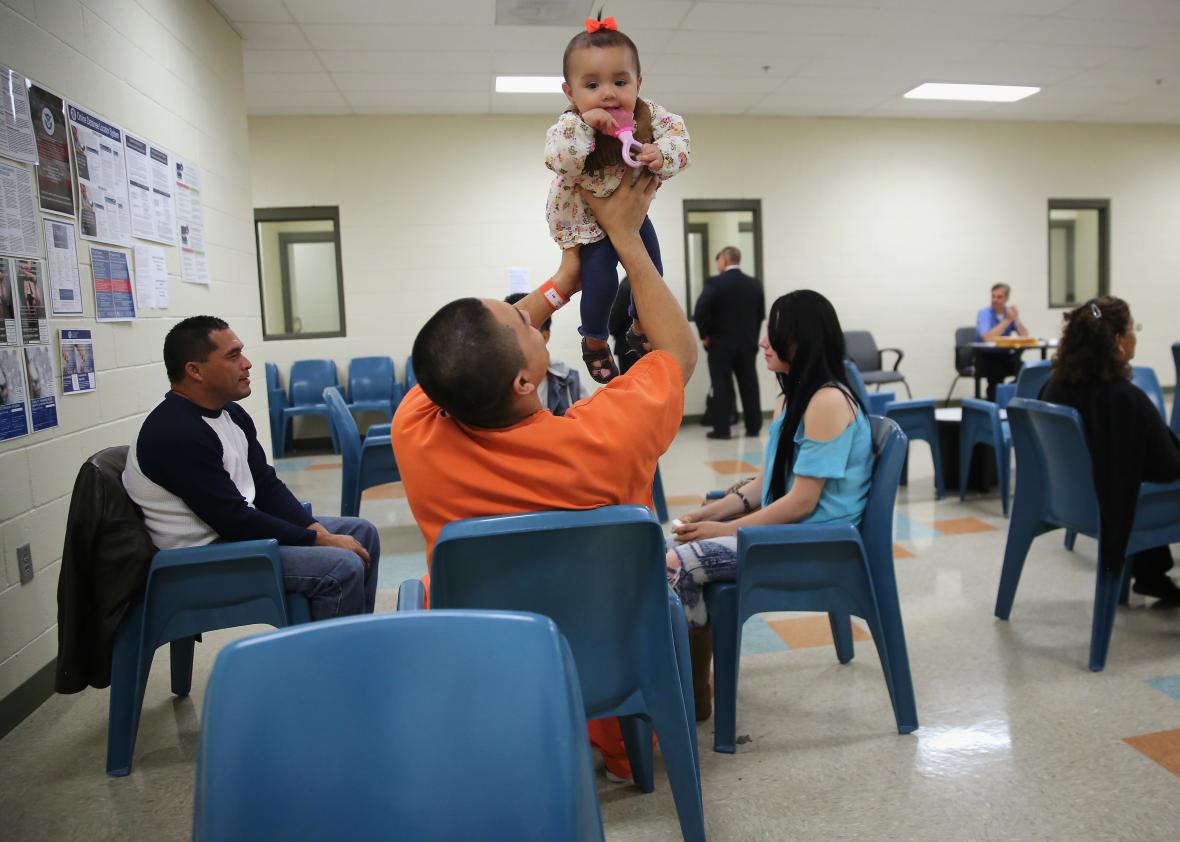The Department of Justice announced on Thursday that the federal government will stop relying on private prisons to house inmates, phasing them out over the next few years. Because states will continue contracting with private prisons, Thursday’s move won’t dislodge them altogether from the American criminal justice system. But the DOJ’s vigorous criticism of the substandard services of private prisons undoubtedly marks a shift in the political landscape—and a considerable victory for undocumented immigrants, who arguably suffered the most from the federal government’s use of such facilities.
Currently, private prisons house about 22,660 federal inmates, many of whom are immigrants awaiting (or appealing) their deportation. Because the detention of undocumented immigrants is so lucrative for private prisons, the industry has spent millions of dollars lobbying for harsher enforcement of immigration laws. Private prison lobbyists have focused on persuading Congress to maintain a federal quota that requires the detention of a certain number of immigrants at all times. These lobbyists have also spent millions on the state level to encourage legislators to pass draconian immigration laws that ensnare more immigrants and send them into the federal detention system. Of the 36 co-sponsors of Arizona’s unconstitutional 2010 immigration law, for instance, 30 had received campaign contributions from private prison companies and lobbyists.
Because private prisons are not subject to the same federal public records laws as government-run prisons, many facts about their operation remains intentionally shrouded in mystery. (The industry has spent $7 million lobbying against proposed policies that would apply public records laws to their facilities.) One investigation found that some private prisons put inmates in solitary confinement for extended periods simply because there are no other beds available. Another found routine abuse and neglect, including inhumane overcrowding and vermin infestation. (A blockbuster Mother Jones report released this summer documented the many horrors of private prison life in graphic detail.)
Private prisons are often touted as a deal for taxpayers, and the industry has heavily promoted the notion that they are less expensive to the government than traditional facilities. This contention, however, appears to be a myth. While industry-funded studies have found that private prisons are marginally less expensive, independent analyses have arrived at a different conclusion: These facilities cherry-pick their inmates, housing the healthier ones and passing along the “high need” (i.e., more costly) prisoners to government-run prisons.
The DOJ’s recent report on private prisons, the impetus behind its Thursday announcement, noted the weakness of the industry’s claims of cost-effectiveness. It also confirmed what so many investigations have already found: Private prisons have serious “safety and security deficiencies” and have “incurred more safety and security incidents” than government-run prisons. “In recent years,” the report noted, “disturbances in several [private] prisons have resulted in extensive property damage, bodily injury, and the death of a Correctional Officer.” The facilities may also provide inferior medical services; in 2011, inmates at one private prison assaulted staff members after their allegedly negligent response to a medical emergency resulted in an inmate’s death.
This year is an especially opportune moment for the shift away from private prisons, since broader criminal justice reforms have spurred a steady decline in the federal prison population (including a drop in private prison inmates). As Deputy Attorney General Sally Yates explained on Thursday, “The fact of the matter is that private prisons don’t compare favorably to Bureau of Prisons facilities in terms of safety or security or services, and now with the decline in the federal prison population, we have both the opportunity and the responsibility to do something about that.”
Shortly after the DOJ’s announcement, shares in America’s two largest private prison companies dropped 40 percent, an immediate indication that the industry’s halcyon days of high profitability could be coming to an end. Unfortunately, the DOJ’s move against private prisons won’t end these companies’ affiliation with the federal government. The Department of Homeland Security runs more than 100 immigration detention centers around the country—many of which are owned and operated by the same companies that run private prisons. (One of these companies just received a $1 billion contract from the Obama administration to detain Latin American asylum seekers.)
These centers must be civil, not punitive, in order to comply with the Constitution. But in practice, they’re often plagued by the same problems that spurred the DOJ to disassociate with private prisons. Thursday’s announcement, then, may be a considerable victory. But it won’t prevent the private prison industry from continuing to profit off immigration detention.
